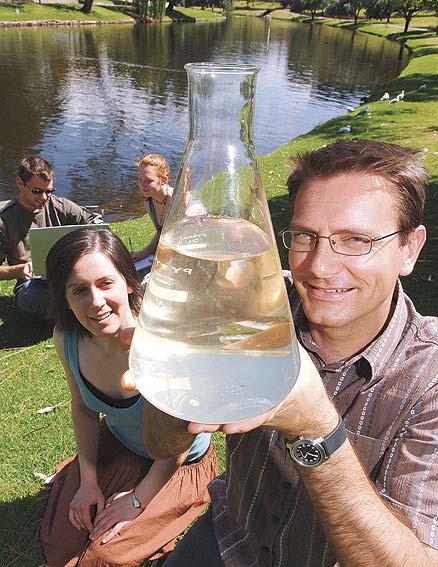This is how i teach

Professor Holger Maier
This month we spoke with Professor Holger Maier, Faculty of ECMS educator and alumnus of the University of Adelaide. He discussed thoughts on the importance of context in learning, and the teaching methods he utilises.
What do you like most about teaching in your discipline?
I love that Environmental Engineering is concerned with understanding and addressing the grand challenges we are facing as local and global citizens, such as climate change, sustainable water, energy and food supply, waste and pollution management and natural hazard risk reduction. I particularly like the focus on developing solutions that have real societal impact, rather than just understanding underlying problems. Knowing that I can play a small part in preparing the next generation of environmental engineers to have a positive impact in the world makes teaching in my discipline very exciting and rewarding.
How would you describe your approach to teaching/your teaching philosophy?
The primary philosophy that underpins my teaching is to engage students via immersive, realistic, project-based learning activities. This provides a framework that enables learning to take place in an applied and motivating context and enables students to delve into topics more deeply in an exploratory manner. The idea is for students to achieve course learning outcomes by working on an engaging problem that draws them in - I often receive feedback from students indicating that they learn a lot without realising it, as learning happens as a by-product of working on an interesting project. I introduce the project in the first lecture and students generally work on this for the entire semester. This provides the motivation for wanting to find out relevant theoretical concepts and shows how these concepts relate to each other in an authentic setting. I can’t overemphasize the importance of context – it is difficult to take in and remember information if there is no perceived need for this. Once students are interested and motivated, the rest takes care of itself. The success of this approach rests on the design of the project – it has to incorporate key learning outcomes and concepts in a way that is realistic and makes sense to students.
Maier H.R. (2008) A hybrid just-in-time / project-based learning approach to engineering education, 19th Annual Conference of the Australasian Association for Engineering Education, December 7-10, Yeppoon, Australia.
Maier H.R., Baron J. and McLaughlan R.G. (2007) Using online roleplay simulations for teaching sustainability principles to engineering students. International Journal of Engineering Education, 23(6), 1162-1171.
What is your favourite way to use technology to enhance learning?
I have been using the “flipped classroom” model since 2007, even though it didn’t know it was called that back then! I just did what made sense to me at the time, which was to use online modules for the delivery of information-based content. This not only frees up face-to-face time with students for more meaningful interactions, but enables information-based content to be delivered in a more engaging way using technology. For me, this involved using online modules that not only include audio-narrated slides, but also relevant video clips, embedded quizzes and other interactive content. I have also used this technology to work with industry to develop online modules that illustrate the practical application of the theoretical concepts and project students are working on to provide additional context and motivation.
Maier H.R. (2009) Bringing industry experience into the "classroom" via multimedia flash presentations, 20th Annual Conference of the Australasian Association for Engineering Education, December 6-9, Adelaide, Australia, 501-506.
Maier H.R. (2008) Increasing student engagement in online environments using multimedia flash presentations, 19th Annual Conference of the Australasian Association for Engineering Education, December 7-10, Yeppoon, Australia.

Professor Maier with some of his students
How does your teaching help prepare students for their future?
We are living in an environment where knowledge and technology are changing more rapidly than at any other time in history, to the point where the information students are exposed to during their university studies is almost obsolete by the time they graduate. In addition, our world is becoming more complex and the notion that there is a “best” solution to many of the challenges we face is somewhat naïve. Providing students with the opportunity to immerse themselves in “messy”, realistic projects, while providing careful scaffolding to provide the relevant “tools of the trade” along the way, is an excellent way of helping students to prepare for the future, as it teaches a range of transferable skills that will become increasingly important in a world of increasing complexity, uncertainty and automation. These include problem solving, critical analysis and thinking, the ability to deal with uncertainty, the ability deal with competing values and objectives, the ability to work in teams and the ability to communicate clearly and effectively.
Maier H.R. (2007) Meeting the challenges of engineering education via online roleplay simulations. Australasian Journal of Engineering Education, 13(1), 31-39.
Maier H.R. and Baron J. (2005) Developing online roleplay simulations for preparing engineering students for multidisciplinary and international practice. Proceedings of the 2005 ASEE/AaeE 4th Global Colloquium on Engineering Education, Australasian Association for Engineering Education. Sydney, Australia, September 26-30.
